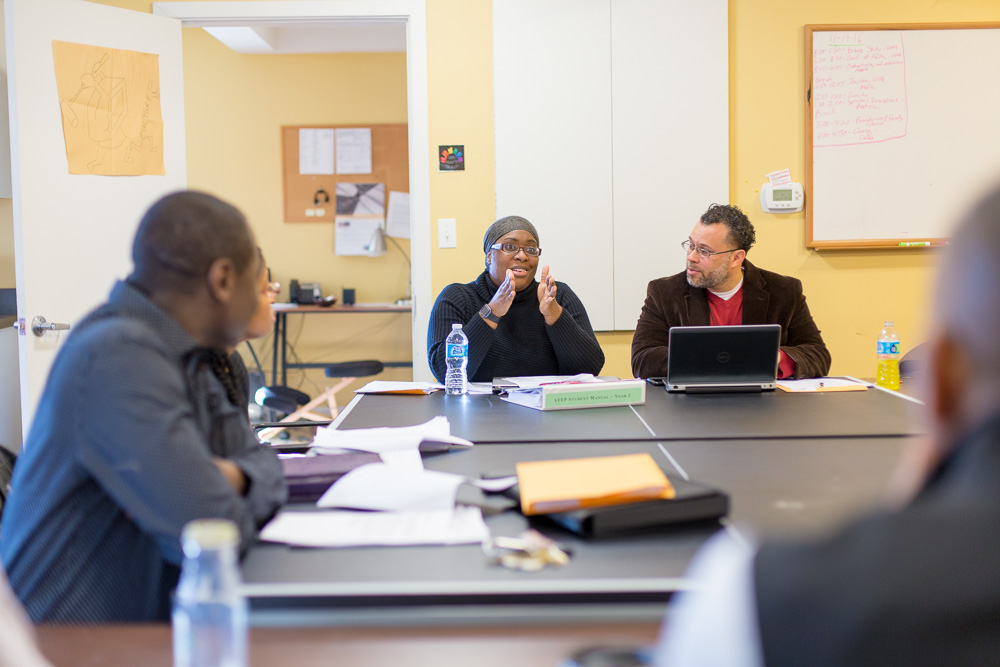Ruth Njika serves as assistant youth pastor, church leader, and assistant praise and worship team leader in a Hyattsville, Maryland, church with 50 members hailing primarily from West Africa. An interpreter assists attendees more fluent in French than English.
Akeia Rossiter coordinates outreach for a church in the metro Washington, D.C., area with members representing more than 30 ethnicities, none of them a majority culture within the congregation.

Pushkar Mangraty serves as an elder in a 43-member congregation of Nepali and Bhutanese immigrants in Baltimore. The church has no pastor, and Mangraty shares preaching duties with two other members. Services are held in Nepali.
Samuel Admasu co-pastors a 448-member Amharic-speaking Ethiopian church in Alexandria, Virginia.
What do these diverse individuals hold in common? Three of the four attend Mennonite-affiliated congregations. More importantly, the quartet shares a thirst to learn and a hunger to hone skills to better serve their church brothers and sisters. To that end, they come together with six others one Saturday per month during the academic year in Washington D.C., as participants in the Study and Training for Effective Pastoral Ministry (STEP) program. The program is offered by Eastern Mennonite Seminary Lancaster (Pa.) and Eastern Mennonite University, with curriculum jointly owned by EMU and Lancaster Mennonite Conference.
STEP students shoulder multiple responsibilities. Besides leadership roles in church, most work part- or full-time and also raise children. Mangraty has three children under age 4; Njika, two very young children; Rossiter, three of school age; and Admasu, two in early elementary. The program, tailored precisely for busy people like these, has been offered by EMU Lancaster for 13 years. During that period, 92 participants have graduated.
Practical learning

The D.C. cohort — a group that will stay together for the three-year program — brims with enthusiasm. For many, STEP offers their first formal training in Christian ministry; it is open to all denominations.
Participants quickly apply techniques and ideas; in addition to accredited coursework, the program requires eight hours of ministerial work monthly in their congregations. At the end of three years, participants will have a certificate in pastoral ministry, as well as 30 undergraduate credits at EMU.
Partnership with local congregations is a key feature of STEP, said Mark Wenger, director of pastoral studies at EMU Lancaster and STEP administrator. All participants work with a supervisor/mentor in the church or conference, and many are aided with tuition costs by their congregation or conference.
Inspiring and invigorating
STEP helps energize its participants for ministry.
“STEP has transformed my life,” said Njika, who grew up in Cameroon. “I’ve grown spiritually and learned how to better relate to others. When the program came to D.C., I saw it as a big opportunity to help me answer the call of God in my life.”
Admasu confessed that before engaging with coursework on preaching, he was stuck in his mindset. “I’ve learned I can be myself spiritually, but use techniques to improve my communication skills. I was closed, locked, but now am open.”
Mangraty had become discouraged in his preaching ministry, thinking it was “too hard.” It involves financial sacrifice; he works as a driver for Uber and Lyft to maintain a flexible schedule. He had reached his limit and found a full-time Monday through Saturday position. But after a STEP session, he dropped out of the new job’s training program and rededicated himself to “the job God appointed to me.”

Mangraty holds two associate degrees, but lacked training in religion and ministry. In STEP, he’s reading the Bible critically, in discussion with classmates. He’s grateful to learn more about the context of biblical figures who experienced insurmountable difficulties and sacrifices to serve God.
“My energy level soars in our interpersonal sharing,” said Mangraty.
Rossiter has mediated conflict resolution sessions with techniques learned in STEP, “some successfully,” she said with a smile. She’s grateful for STEP’s practical orientation. Last year, for example, each student preached to other class members, who critiqued them. “We learn here in the classroom, go out there and apply it, and then bring it back here for discussion,” Rossiter said.
STEP was created to provide ministry leadership training for Mennonite congregations in southeastern Pennsylvania. It has particularly appealed to ethnic, urban congregations, and rural congregations that call leaders from within their ranks. The program is geared to adults without a bachelor’s degree. The curriculum includes coursework on Bible study skills, the history of Christianity, sermon preparation, pastoral care, peace and conflict transformation, and spiritual formation.
The mix of “cradle Mennonites from the farmland and Vietnamese immigrants and other urban Mennonites in the same classroom makes for interesting and sometimes challenging discussion,” Wenger said. “Each side asks questions that don’t ordinarily get asked.”
“STEP’s original vision was for those who are called into pastoring who haven’t had the chance to go to college or seminary,” he added. “But it’s also been beneficial for lay leaders.” Only recently has STEP extended from Lancaster to Washington D.C., and before that, to Philadelphia.
“For the past 20 years, I’ve been too busy to go to school,” said Admasu. “The Lord told me one day I would go, and I think STEP is the Lord’s answer.”
Editor’s note: STEP participants and their congregations include Samuel Admasu, Amanuel Ethiopian Evangelical Church, Alexandria, Va. (unaffiliated); Pushkar Mangraty, Unity Christian Church of Baltimore, Dundalk, Md. (Lancaster Conference); Ruth Njika, Christian Missionary Fellowship International, Hyattsville, Md. (Franklin Conference); and Akeia Rossiter, Capital Christian Fellowship, Lanham, Md. (Lancaster Conference).

I am encouraged to see STEP in action outside Lancaster. This feeds an overwhelming hunger to see the Church living as one in the Spirit, equipping one another and collaborating across the walls we built in the past to separate us! “Even so, come Lord Jesus!”
This is awesome. God is doing something great in us and through us. I blessed God for STEP. More Grace to the Director, pastor Mark Wenger and all the instructors. God bless you.